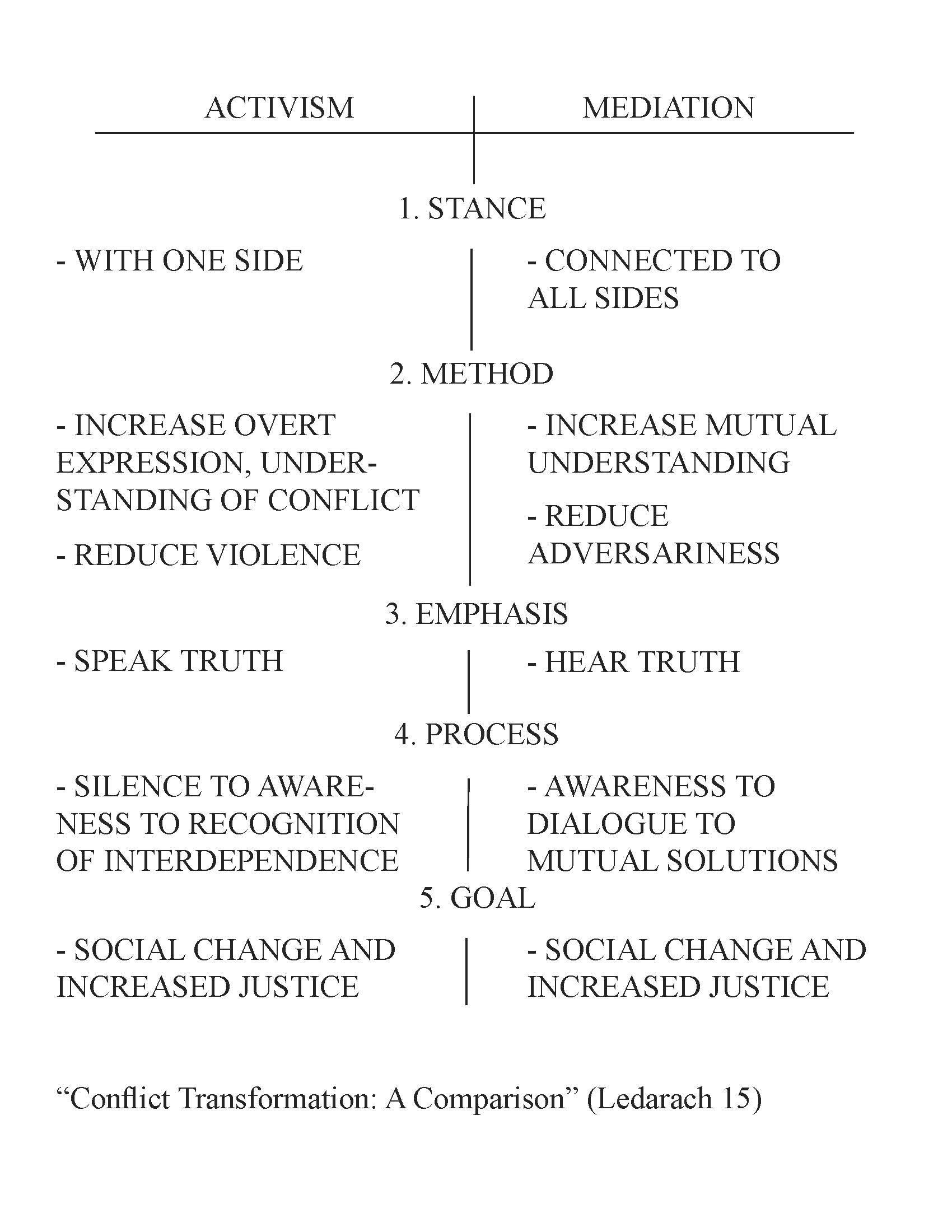This is the first in a series about conflict resolution, dialogue, mediation, justice, and how these concepts might advance the conversation about Mormon feminism. With the Church’s March 17 letter to Ordain Women, I began to analyze the conflict as a case study and consider the measures that, as a mediator, I would recommend. I want to emphasize that this series is an attempt to analyze and mediate and I am deliberately trying to avoid taking a public position in the conflict or on ordination.
A note on vocabulary: Church—in this essay I am referring to Church leadership and the majority of members who do not support women’s ordination. This is not intended to send the message that supporters of ordination are not part of the Church or that their needs are not important.
Conflict—while conflict usually has a negative connotation, it is important to recognize that conflict is continual part of human interaction and that it has potential to be constructive.
Advocacy—may take many forms, but I believe the best definition is that it is about speaking from one’s own point of view.
REVOLUTIONARY VS. RESOLUTIONARY
“I never saw an instance of one or two disputants convincing the other by argument.” -Thomas Jefferson
People who work in conflict resolution believe that conflicts don’t just happen. They are the products of actions and groups to move into adversarial positions. Similarly, conflict resolution doesn’t just happen. A conflict will either enter a static state, end with one party being annihilated, or end with a restructuring of the relationship and usually a shift in the balance of power. One could say that the excommunications of feminists in the 1990s were an attempt at the second option and its failure would hopefully indicate that the Church does not want to repeat that strategy.
This series of posts intends to focus on the social conflict between Church leadership and OW. Social conflict means that two or more groups or individuals “manifest the belief that they have incompatible objectives” (Kriesberg 2). Whether or not OW intended to enter the public sphere in a position of conflict with Church leadership is less important than the fact that an adversarial relationship has developed through actions and reactions from both groups. The letter released on March 17 escalated the conflict by positioning OW as part of the anti-Mormon demonstrators and by sending the message that Church members must choose sides.
The Church’s willingness to escalate the conflict was hard to read for many of us who are ambivalent about ordination but believe in the need to address women’s concerns in the Church. The reaction to the Church’s escalation was immediate and intense. Social media was flooded with appeals for submissions to the OW website and greater numbers of people to turn out for the Conference event. On the other side, Church members who support the status quo hurled angry vitriol on Facebook and blogs. While the escalation prompted many feminists to decide to submit profiles to OW or walk with them in April, my training in conflict resolution pushes me toward a different path. I am inherently a resolutionary rather than a revolutionary. I once had the fire of an activist (enough of a fire, at least, to get called into the BYU Student Association’s office and be accused of being an environmental terrorist*). But as I came into full adulthood, I realized that I am more of a bridge builder than a barn burner.
What are the similarities of revolutionaries and resolutionaries? Significantly, advocacy and mediation share the goal of “restructuring unpeaceful relationships” (Lederach 9). Their activities can be complementary and mutually supportive (14). Indeed, if mediators sacrifice justice (which is the best recipe for sustainable peace) in quest of temporary peace, they have failed. Although restructuring a relationship occurs most often through confrontation and advocacy (consider day to day interpersonal conflicts), justice does not automatically follow activism. Mediation can facilitate a mutually acceptable option (14).
There are some important differences as well. Advocacy takes one side while mediation “chooses to stand in connection to all sides.” Advocacy chooses confrontation, which usually increases the level of conflict. For revolutionaries, conflict is a vehicle “to move from silence and complacency to awareness and change”. Resolutionaries, aware of the potential violence inherent in conflict, seek to “increase mutual understanding while reducing adversariness.” While on the surface these activities seem to be at odds, as one pursues activities that will increase conflict and the other seeks to decrease it, a sustainable peace depends on seeing them as mutually interdependent (Lederach 15).
While advocacy is about speaking from one’s own point of view, I hope to use this series to engage in a dialogue. Dialogue is about engaging in “a conversation with a center, not sides.” Its intention “is to reach new understanding. . . . We do not merely try to reach agreement, we try to create a context from which many new agreements might come.”
The word dialogue comes from Greek, meaning “through (dia) word (logos)”. However, an even earlier meaning of logos was “to gather together” and it invoked relationships. Therefore, when the Book of John begins “In the beginning was the Word [logos]” it may have meant, “In the beginning was the Relationship.” Dialogue is “a conversation in which people think together in a relationship.” Vitally important to dialogue is that “you no longer take your own position as final. You relax your grip on certainty and listen to the possibilities that result simply from being in a relationship with others” (Isaacs 19). Rather than trying to change one’s partner in conflict, dialogue asks that we listen better and suspend judgment of the other.
Do you see yourself as more of a resolutionary or a revolutionary? Why?
NEXT INSTALLMENT: The progression of a conflict, how to move from confrontation to negotiation, and what would possibly change the Mormon feminist activist—Church leadership relationship from unstable to dynamic.
(MargaretOH earned a Masters degree in International Peace and Conflict Resolution, with an emphasis in refugees and human rights, from American University. She is currently a stay-at-home mom with two young children and the Art Editor for the Exponent II magazine.)
*The environmental terrorist thing is a true and hilarious story. If the chance presents itself, I’ll share it on this blog sometime.
Works Cited:
Kriesberg, Louis. Constructive Conflicts: From Escalation to Resolution. Lanham, MD: Rowman & Littlefield, 2007. Print.
Isaacs, William. Dialogue and the Art of Thinking Together. New York: Currency, 1999. Print.
Lederach, John Paul. Preparing for Peace: Conflict Transformation Across Cultures. Syracuse, NY: Syracuse University, 1995. Print.








23 Responses
I appreciate civil discussion about these matters but I take issue with what you mention as “Church members who support the status quo hurled angry vitriol on Facebook and blogs. While the escalation prompted many feminists to decide to submit profiles to OW or walk with them in April…”
I believe this is one persons view and not necessarily an accurate assessment. After all, there is no proof to that statement. I have seen mostly civil support of the Church’s response. The majority of those responses on the Mormon Newsroom facebook simply liked it or said, “I have testimony of the Lord’s prophets and their timing”. I also saw tons of moderate feminist bloggers come to the stage to voice their support of the Church and it’s response to Ordain Women.
Now I’m sure this isn’t everyone. There will always be those who use hate and aggression to get their view across. When completing this essay on conflict resolution, I would personally like to see a more unbiased approach to the project. That’s what the whole aim is isn’t it?
Daniel, thanks for giving me a chance to better state that sentence. I agree that most members of the Church, even if they disagree very strongly with OW, have had mild responses to the conflict. I should have been clearer that the angry reactions came from a small but very vocal minority. Check out the Ordain Women FB page to read language that is aggressive, angry, and pretty jaw-droppingly hostile. Unfortunately, in every conflict under the sun, the extremists are louder and more vocal and so it is easy to use them as spokespersons for one side of a cause. I should not have made that mistake. However, it is also a mistake to write them off as unimportant to the conflict simply because they are in the minority. Activists always play a larger-than-life role in a conflict and need to be taken seriously since they so often derail a peace process.
Sure, it’s anecdotal and not statitistical, but anyone with eyes can open them to see there’s a significant sampling of hurtful voices. Not sure what qualifies as minority voice, but I see it among the “everydays,”—they seem to be everywhere. It would be nice to have something statistical, but I have enough friends smarting from the hurt—it’s a real thing.
Daniel – I personally know three individuals who will walk with the OW group to ask admittance to the general priesthood session as a direct result of the letter published in Des News. These are not members of OW, but people who were appalled by the church’s response. My younger sister is one of them. So, there you have more than “one person’s view.” If I, in my limited circle, know three such people – no doubt, there are many more.
He makes an important point. I haven’t seen or heard the vitriol you refer to…..most of my friends have ignored the whole thing. For all my rebellion, I feel more comfortable within a patriarchal order; but I don’t care enough to fight about it. I don’t want the priesthood but I don’t want to get out of bed.
I love this essay, Margaret, because in my heart I crave serenity and I agree with most of your conclusions. I didn’t notice any exhortation to members about taking a stand.
There are many things that trouble me—about the church, about OW (which I do believe is motivated by agenda)…..I bitch loud and proud in my ward when things bug me (like when I told my former–and long-winded bishop that I’d had enough and wanted to throw tomatoes at him after 20 minutes). But I’m the ward crazy so I get away with it.
I feel like I’m at a crossroads. I’ve been moderate without taking a firm stand but I’m increasingly more annoyed at the tendency of some to nit-pick anything to criticize. I also question the motives of some who seem to have become more celebrity than activists.
I’m a coward. I support gay marriage and if questioned by my bishop, will be honest, but I’m not jumping on any bandwagons. I still value my membership, my marriage, and relative peace. I am immensely grateful to women who fought for prayer because I’ve griped about it for years, becoming alienated from leaders, friends, and my husband in the process. It’s been painful. Also hilarious when I was asked to give the opening prayer in a stake conference meeting, which resulted in good-natured teasing and actually a”resolutionary” kind of feel, because I was validated. And I used my traditional humorous approach to soften the interactions. Win-win.
But, Margaret, that couldn’t have happened if somebody hadn’t thrown a public fit, which I was wont to do. Still am. I will wear purple, but not pants, to church.
I’ve noticed small tender mercies in church policies and am so grateful to whatever general authority whose softened heart has made them possible.
I’m looking forward to more on this.
AnneGB, I want to clarify a couple points. First, a resolutionary perspective is not one of simply not caring or “not wanting to get out of bed.” On the contrary, it is most often a difficult road that requires sacrifice and determination. Resolutionaries are often vilified by both sides and, once a peace agreement has been reached, often receive none of the credit.
Second and on a related note, it is also not necessarily about having mild opinions. I have very strong opinions about women’s causes in the Church and they are not always moderate (although they sometimes are). Instead, being a resolutionary is about being willing to listen and suspend judgement and to accept that one’s opinions might be wrong. It is about acting in moderation.
Finally, my claim that the Church is asking members to choose sides is based on the idea that the Church is situating OW as antithetical to the Church, which is against their self-identification. While OW is strongly vocalizing itself as an identity that is harmonious with the gospel, the Church seems to be trying to create us/them identities that are incompatible.
It sounds like you’ve had some interesting conflicts on a local level. I wish you well in your work.
Thank you for this post. I’m still processing. However, I think that the vocal minority on both sides are quite useful. The OW movement has made it safe to talk about the gendered financial issues of primary and YW/YM budgets and activities. women praying in general conference, and having formal images of female leaders in the conference center. While the vocal opposition have shown how discordant their hostility and ideas are to the general body of the church. As with Pantspalooza, many became galvanized because of the harsh and exclusionary language they read or received.
I also think that it’s interesting that the letter was signed by a woman from the PR department, and not by the First Presidency. So, the sharp language was seen as coming from a woman, but the male leaders were at a one-step remove.
I think it is nice that so many here have had the good fortune not to witness the vitriolic response from supporters of status quo resulting from the Newsroom’s actions. If you want to know more about that, you can visit the Ordain women Facebook page to see some of it in print. https://www.facebook.com/pages/Ordain-Women/410211199071047
Or, if you know any, you could actually talk to an Ordain Women supporter. Since the Church Newsroom’s open letter to me and some other women was published on Monday (and I would point out that it was published in the Deseret News, with my name on top BEFORE I even received it, even though it was addressed to me) several Ordain Women supporters have received hate mail and some have been disowned by their Mormon families.
With regards to the letter, I was deeply hurt. A letter, written to me, with my name on it, was published in the Deseret News before I could even read it. The tone was harsh–a stark contrast to the polite letter we sent requesting tickets. The Newsroom has ignored the letters Ordain Women has sent requesting private meetings with church leaders, but they respond to our letters requesting tickets publicly, creating the false impression for the public that we have refused to negotiate with the church.
April,
The letter was not sharp, but it was direct. Sharp was how you perceived it. But simply put, they reinstated Church doctrine and expounded on what has already been said. The PR department of the Church is directly linked with the brethren. I’m sure anything that is posted has to be passed by the brethren. This is a big deal. They are listening, this IS their decision. But the tone which OW has taken in demanding their needs to be met has not given them a good chance of actually meeting with the brethren. The letter was as respectful as it could be – respectfully asking OW (the group, not the individual members) to not practice their demonstration on temple grounds.
I think it would be chaos for OW or any group representing a divisive subject to be on temple square during conference. It’s a security concern to have OW and groups entering the conference center all in one big crowd like that. The Church can’t control what people could do in that scenario. I’d like to have faith that everyone would be respectful but there’s always one bad egg.
I think it is sad for people to give supporters of OW a hard time. To nit pick and bully is not appropriate. And I truly am sorry for you and other members who experience any of this. I do not support the Ordain Women movement, but I do see them as my sisters in our gospel family.
I appreciate your conclusion and your view of OW as your sisters.
One point, though. You said, “The letter was not sharp, but it was direct. Sharp was how you perceived it.”
Direct is how you perceived it. It’s not as though you sit in some privileged interpretive position while April reads things through distorting lenses. We all read things through our own lenses.
I find the vocabulary you put forth interesting and helpful. I am also a resolutionary, mostly because I believe that everyone has a right to be heard and there are more cases than not where one group’s position does not deserve to be annihilated. Usually both sides of an argument make sense to me. I appreciate the 11th article of faith and think we could talk about it more.
Two points to bring up: First, I somewhat agree with what has been said – the vast majority of what I have seen is church members quietly agreeing with the church’s letter, but I have not seen much vitriol. I think the majority of the women in the church who do not support OW are frustrated – not with OW – but because they feel *their* voices are being ignored. When the NYT and LAT are out there interviewing OW and actively ignoring or de-prioritizing the inputs and comments of non-OW LDS women, they are being ignored and silenced in the media. The media is taking the OW movement and superimposing a worldly understanding onto the situation, and this leaves no room for thoughtful, intellectual dissent on the part of LDS women. So I’d say that the responses I’ve seen have not only been civil, but even the strongly-worded ones are not motivated by vitriol but by relief that finally SOMEONE is speaking for them. That’s completely different. (I find it ironic as an LDS woman that only a segment of LDS women are being given a voice right now when OW speaks and the media listens.)
The other word in this article I question is the word “escalate.” In my observations, it is OW that has been escalating, and that this response from the church is relatively mild. Perhaps I’m simply reading the wrong sources, but OW is actively seeking greater visibility, making bigger splashes in the media, taking on stronger verbal positions….why is this not labeled escalation? I’m really, truly tired of the church being framed as the instigator and the escalator, because I really can’t see a framing of it that makes that true, unless you view them as the enemy, in which case nearly anything they do will be labeled as “escalation.”
As an aside, has anyone considered the legal consequences of the church *not* assigning protests to specific zones? If a precedent is set that only people outside the church are protesting in the “free speech zones” and the church looks the other way when members gather and protest, then that puts them on shakier legal ground when it comes to the church being able to protect it’s property from disruptive protest. A group (including those OW would dislike) could simply gather a few LDS people in their ranks and protest wherever they wanted, and the church would be stuck with the precedent of having allowed that before. It puts them in a terrible position of trying to maintain the spirit of Temple Square. So I disagree with the characterization that this is an escalation, or a statement by the Church that OW is “outside the church” or “as good as non-members” – I think it’s simply a step with foresight that will prevent future undesirable things that OW would probably also find undesirable if they stopped and thought about the legalities. Few people ever do.
Lastly let me say that although I am not an OW member, I sympathize with my sisters and I have my own hopes for future revelation on the roles of women. I think that revelation will accompany a culture shift, and I recognize the need for some activism in a culture shift. But I think OW is hurting their own cause (and my cause) by making so many of their sisters feel silenced, less important, and less enlightened. Taking extreme stances often causes the other side to retreat into an opposing extreme stance, which is what is happening. As a resolutionary, I’m hurt by that more than anything.
Thanks for your comment. You bring up some interesting points. Firstly, it is not at all uncommon for the moderate majority to feel frustrated with the extra attention given to activists. Indeed, this frustration often leads to increased polarization within a conflict, as people feel more and more like they can’t identify with a vocal minority and want to emphasize their differences.
I agree with you that OW has also escalated the conflict, and that they may in fact be the primary escalator. As I said, revolutionaries see conflict as a vehicle, so it is inherent in their purpose. This is why I wrote about it less. I stand by my claim that the Church’s letter was an escalation, as I see it as taking an unnecessarily adversarial tone. If the Church was intent on avoiding another series of photographs outside the tabernacle, they could have set aside a third area that was separate from the anti-Mormon crowd. Perhaps less important than whether it was intentionally an escalation is the fact that it was perceived as an escalation, evidenced by OW’s own escalation: the flood of social media calls to join them.
And most importantly, thank you for your touching honesty about your experience and feelings about OW. I think it’s vital that we hear a spectrum of voices, including those who have felt violence in this conflict.
Thanks for your thoughts. I can agree that the Church ‘escalated’ insofar as we’re also using that term to apply to OW.
I understand why you wrote about OW’s escalation less in this context – what you said about it being inherent in their position is true. You might consider mentioning it in your writing anyway. It will not be obvious to everyone that you are analyzing the situation, and many will interpret this as support for OW rather than an intellectual treatment of it, if that makes any sense. Just some unsolicited advice from a fellow Internet writer who has a lot of experience with assuming people would understand nuance and has found much good in being explicit and addressing both sides.
Margaret, thank you for focusing on mediation and resolution. This is what I crave!
I have not been fortunate enough to escape being affected by vitriolic words. I recently made what I thought was a mild, respectful comment on a facebook friend’s post regarding women attending men’s meetings, and the subsequent comments were disturbing to say the least. One person called for the excommunication of members of Ordain Women. Another, presumably responding to my comment, admonished that we must not “speak evil of the Lord’s anointed.” I am not even a member of Ordain Women, and I was amazed at how much these comments upset me. I can only imagine the feelings of those who are more directly affected by the kind of conflict escalation that has been happening.
Wow! Wonderful post. Thank you, Margaret! In answer to your question, I have to admit, I’m a bit of a mix. I have a fighter’s heart, but that proves exhausting in certain settings. So, I’m learning to be a resolutionary. It’s a great life lesson. I’m willing to take whatever time is needed to learn how to do it better. This essay helps. Thanks again.
“Dialogue is about engaging in “a conversation with a center, not sides.” ” This was my favorite line.
Bingo ;). I look forward to reading more.
Margaret…. Will you please contact me? If you’re at all interested, I’d love to have your help blogging for Circling the Wagons.
Part of the problem as I can observe it is that there are so few means to ask questions and receive direct answers from the priesthood authorities.
While public protests are disruptive to others, especially in a spiritual setting, the position of women who feel voiceless asking for their voice to be heard in one of the few ways left open to them after the abrupt dismissal of their questions by those who are in authority to answer them is a humble position that asks for sympathy rather than a response of anger or rebuke. Certainly the attempt to voice concerns, questions, and desire for revelation through normal channels has been dishearteningly unsuccessful.
How sad that the church authorities did not consider the needs of their flock and respond to them with more sensitivity and more transparency. I think of the New Testament description of the shepherd rushing to aid the lost and injured sheep, and the love of that gesture, and wish for that here.
Amen, W. I love your comment!